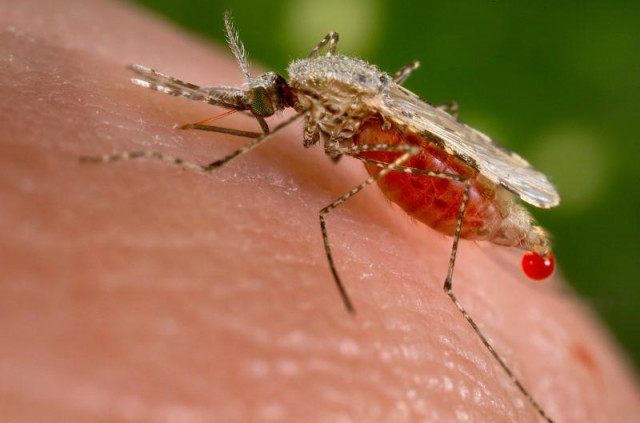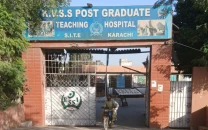Capital’s rural population vulnerable to malaria
Health experts say malarial parasites now resistant to treatment

Malaria. PHOTO: REUTERS
Medical professional Dr Arif Azad said that many people are exposed to infectious mosquitoes owing to the requirements of their work such as policemen, gardeners, and other park workers, sanitary workers and people living in rural areas of the federal capital. These people, he said, have limited access to health facilities and malaria prevention programmes.
“These people not only have limited access to diagnostic testing, preventive measures, and treatment services, but their undiagnosed and untreated parasitemia may also contribute to transmission to surrounding populations in receptive areas,” he said.
To eradicate the disease in these areas and protect the people living here, he suggested taking steady steps to gain full control over it by allocating the necessary funds for effective surveillance and demonstrating the political will required to eradicate the disease.
He called for ensuring the availability of free testing services for malaria at all public hospitals for the public besides focusing on research work to cover the treatment.
Moreover, Dr Azad suggested that health officials try and reduce incidents of malaria by distributing mosquito nets to help protect people from the malarial carriers while they sleep.
Dr Sharif Astori of the Federal Government Polyclinic (FGPC) Hospital said that malaria is a disease caused by a parasite that is transmitted to humans through the bites of infected mosquitoes.
Describing the symptoms of malaria, he said that people who have contracted the disease usually feel very sick with a high fever and shaking chills.
While the disease is uncommon in temperate climates, malaria is still quite common in tropical and subtropical countries such as Pakistan. He added that many malarial parasites have now become resistant to commonly available drugs used to treat the disease.
Dr Wasim Khawaja from the Pakistan Institute of Medical Sciences (PIMS) said that a malarial infection is generally characterised by the signs and symptoms including headache, nausea, vomiting, muscle pain and fatigue along with the telltale signs of fever and chills.
He added that other signs and symptoms may include sweating, chest or abdominal pain and cough. These symptoms begin to manifest a few weeks after being bitten by an infected mosquito. However, some malarial parasites can remain dormant in the body for as long as a year.
He advised patients exhibiting these symptoms to immediately consult their doctor, especially while living in or after traveling to a malaria high-risk region.
The World Health Organisation (WHO) notes that less than one per cent of global funding for investment in health research and development is devoted to the enhancement of means to fight malaria.
The disease affected some 219 million people globally in 2017 and claimed around 435,000, victims, mostly infants and children in some of the poorest regions of Africa.
While several medications are available to treat and control malaria along with effective insecticides to fight mosquitoes — its main transmitter, health experts believe that this is not enough to completely eradicate the disease.
The WHO insists on the need to develop new research and drugs to combat transmitting agents, prevent and treat the disease.
When contacted a health ministry official said that they were taking steps to minimise the incidence and spread of vector-borne diseases such as dengue and malaria in the twin cities of Islamabad and Rawalpindi.
He added that a plan has been devised for hospitals focusing on preventive care, diagnostic facilities, and availability of beds along with treatment protocol.
The official further said that the Islamabad health team is working in close coordination with Rawalpindi health officials for the prevention and control of malaria.
As per the plan, actions are being taken against the disease, including identifying and destroying mosquito breeding sites, covering open drinking water containers, removal of tyres, plastic bags, plastic bottles and other wastes from roofs, draining water from room coolers and trays of refrigerators, formation of six teams of sanitary inspectors and malaria supervisors and formation of 136 teams of lady health workers.
Published in The Express Tribune, October 16th, 2019.



















COMMENTS
Comments are moderated and generally will be posted if they are on-topic and not abusive.
For more information, please see our Comments FAQ